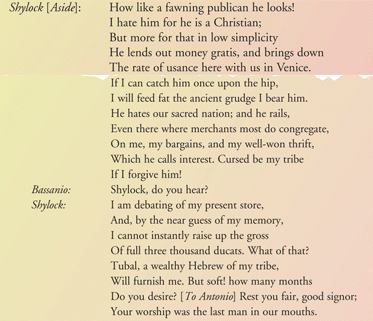Asides and Soliloquies
In his plays, Shakespeare makes full use of the dramatic devices, asides and soliloquies, as a means of revealing to the audience what is in the mind of a character. It is as if the character is speaking aloud to the audience and no one else on stage can hear them. Asides are usually quite short and are often spoken while other characters are on stage.
This video explains Shakespeare’s use of asides and soliloquies.
For example, in The Merchant of Venice, Shylock is a moneylender and Antonio needs to borrow some money from him. Look at this extract.

The Merchant of Venice Act I, scene iii, lines 37–57
What does this aside reveal and why do you think Shakespeare uses it here?
It reveals that Shylock hates Antonio and relishes the idea of getting a hold over him. Shakespeare uses it here to reveal Shylock’s true feelings and therefore increase dramatic tension.
REVISION TIP: Make sure you are familiar with all the soliloquies given by the characters in the play you are studying. Be clear in your mind as to what these soliloquies reveal about the characters.
Some asides are much briefer than the one Shylock uses, but soliloquies tend to be longer and usually occur when no other characters are on stage. In the following example from Henry IV Part One, King Henry’s son, the Prince, has been a complete disappointment to his father and has been apparently living a wild life, drinking with a group of disreputable characters, in particular one called Falstaff. He spends most of his time in the tavern and the brothel. However, early in the play, the Prince, left alone on the stage, delivers the following soliloquy:
I know you all, and will awhile uphold
The unyok’d humour of your idleness:
Yet herein will I imitate the sun,
Who doth permit the base contagious clouds
To smother up his beauty from the world,
That when he please again to be himself,
Being wanted, he may be more wonder’d at,
By breaking through the foul and ugly mists
Of vapours that did seem to strangle him.
If all the year were playing holidays,
To sport would be as tedious as to work;
But when they seldom come, they wish’d for come,
And nothing pleaseth but rare accidents.
So, when this loose behaviour I throw off,
And pay the debt I never promised,
By how much better than my word I am
By so much shall I falsify men’s hopes;
And like bright metal on a sullen ground,
My reformation, glittering o’er my fault,
Shall show more goodly and attract more eyes
Than that which hath no foil to set it off.
I’ll so offend to make offence a skill;
Redeeming time when men think least I will.
Henry IV Part One, Act I, scene ii, lines 217–239
What does the Prince reveal in this soliloquy and why do you think Shakespeare has the character deliver it so early in the play?
The soliloquy reveals that the Prince is only giving the impression of leading a wild lifestyle but this is not his true nature. He knows that when he ‘reforms’ and reveals his true, noble nature, he will surprise and impress people all the more. Through this soliloquy, Shakespeare allows us, the audience, to see the true nature of the Prince early on in the play. We can see him in a way that none of the other characters can.
